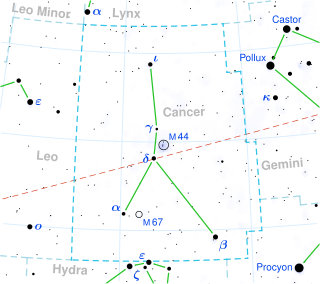G 9-38
Appearance
(Redirected from GJ 1116)
 An ultraviolet band light curve showing several flares on EI Cancri, adapted from Pettersen (1985)[1] | |
| Observation data Epoch J2000 Equinox J2000 | |
|---|---|
| Constellation | Cancer |
| Right ascension | 08h 58m 15.194s[2] |
| Declination | +19° 45′ 47.08″[2] |
| Apparent magnitude (V) | 13.720[3] |
| Characteristics | |
| Spectral type | M8Ve+M7V[4][5] |
| Astrometry | |
| G 9-38 A | |
| Radial velocity (Rv) | 13 ± 5[6] km/s |
| Proper motion (μ) | RA: −767.060±0.122[7] mas/yr Dec.: −100.176±0.083[7] mas/yr |
| Parallax (π) | 194.1443 ± 0.1228 mas[7] |
| Distance | 16.80 ± 0.01 ly (5.151 ± 0.003 pc) |
| G 9-38 B | |
| Proper motion (μ) | RA: −937.133±0.190[8] mas/yr Dec.: −34.559±0.138[8] mas/yr |
| Parallax (π) | 196.2619 ± 0.1976 mas[8] |
| Distance | 16.62 ± 0.02 ly (5.095 ± 0.005 pc) |
| Orbit | |
| Primary | G 9-38A |
| Companion | G 9-38B |
| Period (P) | 360 yr |
| Semi-major axis (a) | 33 AU |
| Details[9][10] | |
| G 9-38A | |
| Mass | 0.12 M☉ |
| Luminosity (bolometric) | 0.000965 L☉ |
| Temperature | 2896±18 K |
| Metallicity [Fe/H] | -0.12(unreliable) dex |
| G 9-38B | |
| Mass | 0.10 M☉ |
| Luminosity (bolometric) | 0.000992 L☉ |
| Other designations | |
| A: Gaia DR2 660597997696173440, LHS 2076[4], NLTT 20638[4] | |
| B: Gaia DR2 660597997697274752, LHS 2077[5], NLTT 20637[5] | |
| Database references | |
| SIMBAD | The system |
| A | |
| B | |
Location of G 9-38 in the constellation Cancer | |
G 9-38, also known as EI Cancri and GJ 1116, is a binary star system consisting of two M-type stars.[11] At 16.7 light-years from the Sun, the system is relatively nearby.[12] The system has a very high stellar flare activity, with average five flares per hour.[1]
In 2015, the search for third star in the system has yielded inconclusive results.[13]
References
[edit]- ^ a b Pettersen, B. R. (July 1985). "Discovery of flare activity on the low luminosity red dwarf system G9-38 AB". Astronomy & Astrophysics. 148: 151–154. Bibcode:1985A&A...148..151P. Retrieved 11 November 2021.
- ^ a b Cutri, Roc M.; Skrutskie, Michael F.; Van Dyk, Schuyler D.; Beichman, Charles A.; Carpenter, John M.; Chester, Thomas; Cambresy, Laurent; Evans, Tracey E.; Fowler, John W.; Gizis, John E.; Howard, Elizabeth V.; Huchra, John P.; Jarrett, Thomas H.; Kopan, Eugene L.; Kirkpatrick, J. Davy; Light, Robert M.; Marsh, Kenneth A.; McCallon, Howard L.; Schneider, Stephen E.; Stiening, Rae; Sykes, Matthew J.; Weinberg, Martin D.; Wheaton, William A.; Wheelock, Sherry L.; Zacarias, N. (2003). "VizieR Online Data Catalog: 2MASS All-Sky Catalog of Point Sources (Cutri+ 2003)". CDS/ADC Collection of Electronic Catalogues. 2246: II/246. Bibcode:2003yCat.2246....0C.
- ^ Zacharias, N. (2012). "The fourth US Naval Observatory CCD Astrograph Catalog (UCAC4)". VizieR On-line Data Catalog. Bibcode:2012yCat.1322....0Z.
- ^ a b c "G9-38A". SIMBAD. Centre de données astronomiques de Strasbourg. Retrieved 29 September 2020.
- ^ a b c "G9-38B". SIMBAD. Centre de données astronomiques de Strasbourg. Retrieved 29 September 2020.
- ^ "G9-38". SIMBAD. Centre de données astronomiques de Strasbourg. Retrieved 29 September 2020.
- ^ a b c Brown, A. G. A.; et al. (Gaia collaboration) (2021). "Gaia Early Data Release 3: Summary of the contents and survey properties". Astronomy & Astrophysics. 649: A1. arXiv:2012.01533. Bibcode:2021A&A...649A...1G. doi:10.1051/0004-6361/202039657. S2CID 227254300. (Erratum: doi:10.1051/0004-6361/202039657e). Gaia EDR3 record for this source at VizieR.
- ^ a b c Brown, A. G. A.; et al. (Gaia collaboration) (2021). "Gaia Early Data Release 3: Summary of the contents and survey properties". Astronomy & Astrophysics. 649: A1. arXiv:2012.01533. Bibcode:2021A&A...649A...1G. doi:10.1051/0004-6361/202039657. S2CID 227254300. (Erratum: doi:10.1051/0004-6361/202039657e). Gaia EDR3 record for this source at VizieR.
- ^ Rojas-Ayala, Bárbara; Covey, Kevin R.; Muirhead, Philip S.; Lloyd, James P. (2011), "Metallicity and Temperature Indicators in M dwarf K band Spectra: Testing New & Updated Calibrations With Observations of 133 Solar Neighborhood M dwarfs", The Astrophysical Journal, 748 (2): 93, arXiv:1112.4567, Bibcode:2012ApJ...748...93R, doi:10.1088/0004-637X/748/2/93, S2CID 41902340
- ^ Nearby Star Summary Table
- ^ Vizier query: Name=G* 1116, Centre de Données astronomiques de Strasbourg, accessed 30 December 2012.
- ^ Nearby Stars Catalog (NSC) Archived 2021-02-27 at the Wayback Machine, Planetary Habitability Laboratory, University of Puerto Rico at Arecibo accessed 31 December 2012.
- ^ Davison, Cassy L.; White, R. J.; Henry, T. J.; Riedel, A. R.; Jao, W-C.; Bailey Iii, J. I.; Quinn, S. N.; Cantrell, J. R.; Subasavage, J. P.; Winters, J. G. (2015), "A 3D Search for Companions to 12 Nearby M-Dwarfs", The Astronomical Journal, 149 (3): 106, arXiv:1501.05012, Bibcode:2015AJ....149..106D, doi:10.1088/0004-6256/149/3/106, S2CID 9719725
- Dittmann, Jason A.; Irwin, Jonathan M.; Charbonneau, David; Berta-Thompson, Zachory K. (2014). "Trigonometric Parallaxes for 1507 Nearby Mid-to-late M Dwarfs". The Astrophysical Journal. 784 (2): 156. arXiv:1312.3241. Bibcode:2014ApJ...784..156D. doi:10.1088/0004-637X/784/2/156. S2CID 18789867. Table with parallaxes.

